Flag of the Second Spanish Republic
.svg.png) | |
| Name | Tricolor |
|---|---|
| Use |
|
| Proportion | 3:5 |
| Adopted | 27 April 1931 |
|
Variant flag of Second Spanish Republic | |
| Name | Bandera de la marina mercante (Civil Ensign) |
| Use |
|
| Proportion | 3:5 |
|
Variant flag of Second Spanish Republic | |
| Name | Bandera militar (Military Flag) |
| Use |
|
| Proportion | 2:3 |
The Flag of the Second Spanish Republic, also known as Spanish: la tricolor, was the official flag of Spain between 1931 and 1939 and the flag of the Spanish Republican government in exile until 1977.
History
The Spanish republican flag began to be used on April 27, 1931, thirteen days after municipal elections results led to the abolition of the monarchy and the proclamation of the Second Spanish Republic.
This same flag had been previously displayed by certain Republican groups as an alternative to the red-and-yellow flag that was identified with the Bourbon monarchy in Spain. As a result of this previous use, the young republic proclaimed in 1931 eagerly adopted this symbol.[1]
The Republican flag was adopted on April 27 and presented to the army of the nation on May 6 with the following words:[2] "The national uprising against tyranny, victorious since April 14, has hoisted a flag that is invested by means of the feelings of the people with the double representation of the hope of freedom and of its irreversible triumph."
El alzamiento nacional contra la tiranía, victorioso desde el 14 de abril, ha enarbolado una enseña investida por el sentir del pueblo con la doble representación de una esperanza de libertad y de su triunfo irrevocable.
The Republican flag was formed by three horizontal bands of the same width, red, yellow, and murrey (mulberry-coloured). The National Flag would have the Spanish Republican coat of arms at the centre (quarterly of Castile, Leon, Aragon and Navarre, enté en point for Granada, ensigned by a mural crown, between the two Pillars of Hercules). This coat of arms originated in 1868 and had been used then by the Provisional Government and later by the First Spanish Republic. The civil ensign or merchant flag would be a simple tricolour without the coat of arms. There was also a military version of the flag with proportion 2:3.
The flag of the Second Spanish Republic was also used by the Spanish Maquis between the end of the Spanish Civil War and the early 1960s, and later by the Spanish National Liberation Front (FELN). Versions of this flag were used in the 1970s by the radical anti-Francoist groups Revolutionary Antifascist Patriotic Front (FRAP) and First of October Anti-Fascist Resistance Groups (GRAPO).
The Republican flag is now widely used by trade unions[3] and left-wing political organizations, such as United Left,[4] the Marxist-Leninist Party (RC) and some factions of the Spanish Socialist Workers' Party. It is also used by republican platforms.[5][6]
Colors
The Spanish Republican flag has three colors, red, yellow, and murrey, Spanish: morado.[7]
La bandera de la República española es roja, amarilla y morada...
The purple of the third color was to represent Castile and León, the proverbial "Pendón Morado" ancient armorial banner of Castile in the flag's colors, while the existing red and yellow symbolized the territories of the former Crown of Aragon.[8] These three colors symbolized a new era for Spain in which no part of Spain was excluded and every Spaniard would be represented.[1]
The morado color
The morado, as a generic term for purple or violet, was previously a widely known color throughout Spain as one of the liturgical colors used periodically in priest robes and hangings in the many churches of the country. It had also been used in antiquity as the heraldic color of the Kingdom of Castile. The Kingdom of León coat of arms bore a purple lion rampant and the flag reputed to have been used at the Revolt of the Comuneros had a yellow castle on a purple background. This color, however, is prone to alterations or fading with time and use, often resulting in one of the varieties of crimson or maroon.
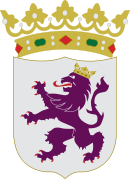 Arms of the Kingdom of León. |
.svg.png) Flag of the comuneros |
As it is an unusual color for a flag, in practice the morado color of the lower band could be violet, purple (purpure) or even lilac, according to the available materials and dyes in each location.[9]
Controversies
Spanish monarchists resented the morado of the new tricolor and a famous soleá was composed at the time when the flag began to be used. These verses indirectly also expressed unhappiness with the reforms introduced by the republican government:[10]
|
|
Since the restoration of the monarchy in the last quarter of the 20th century there are authors that openly contradict former Spanish historians by proclaiming that the Castilian "Pendón Morado" never existed, that it was actually red.[11] The controversy is part of a probable attempt to discredit the flag of the Second Spanish Republic by claiming that its colors are wrong. Still, sound historical documents prove that murrey-colored banners were formerly used in Castile & Leon.[12]
Until recently the official badge of the Real Madrid C.F. had a purple band based either on the Castilian or on the Spanish republican colors that was added after the proclamation of the Second Spanish Republic in 1931.[13][14] The color of the band was changed from morado to navy blue in 2001 without sufficient explanation.[15]
Use of the flag
 Cover of the Constitution of the Second Spanish Republic
Cover of the Constitution of the Second Spanish Republic Allegory of the Spanish Republic
Allegory of the Spanish Republic Statue of Liberty Spanish stamp honoring the 150th anniversary of the U.S. Constitution
Statue of Liberty Spanish stamp honoring the 150th anniversary of the U.S. Constitution Allegory of the Spanish Republic embracing Marianne, symbolizing the French Republic. 1931
Allegory of the Spanish Republic embracing Marianne, symbolizing the French Republic. 1931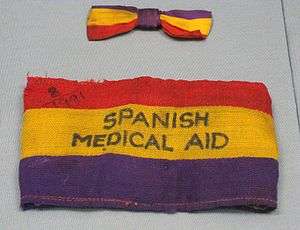
 American Medical Bureau (AMB) armband
American Medical Bureau (AMB) armband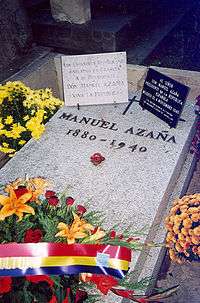 Grave of President Manuel Azaña (1880-1940) in Montauban, France
Grave of President Manuel Azaña (1880-1940) in Montauban, France German Democratic Republic medal of Hans Beimler
German Democratic Republic medal of Hans Beimler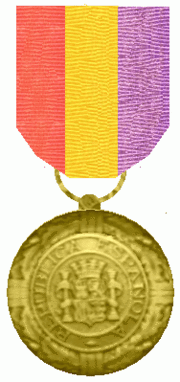 Order of the Spanish Republic in Exile
Order of the Spanish Republic in Exile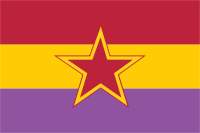
- Civil use
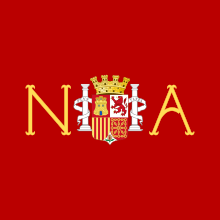 Presidential Standard of Niceto Alcalá-Zamora (1931-1936)
Presidential Standard of Niceto Alcalá-Zamora (1931-1936)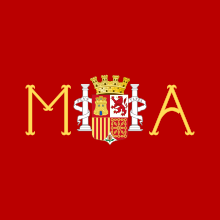 Presidential Standard of Manuel Azaña (1936-1939)
Presidential Standard of Manuel Azaña (1936-1939) Ministerial Standard
Ministerial Standard Yacht ensign used on recreational boats or ships (1931-1939)
Yacht ensign used on recreational boats or ships (1931-1939)
- Military use
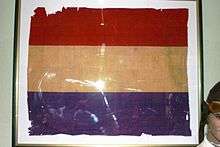 Spanish Republican Army flag used in the Battle of the Ebro
Spanish Republican Army flag used in the Battle of the Ebro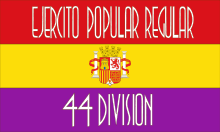 Flag of the 44th Division of the Spanish Popular Army
Flag of the 44th Division of the Spanish Popular Army The flag of the International Brigades
The flag of the International Brigades
 Polikarpov I-15 of the Spanish Republican Air Force
Polikarpov I-15 of the Spanish Republican Air Force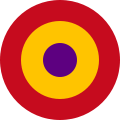 Roundel of the Spanish Republican Air Force
Roundel of the Spanish Republican Air Force Fin flash of the Aeronáutica Naval, the naval aviation of the Spanish Republican Navy (1931-1936)
Fin flash of the Aeronáutica Naval, the naval aviation of the Spanish Republican Navy (1931-1936) Spanish Republican Navy. Ensign of the Viceadmiral of the Fleet
Spanish Republican Navy. Ensign of the Viceadmiral of the Fleet Spanish Republican Navy. Captain at Sea Pennant
Spanish Republican Navy. Captain at Sea Pennant- Spanish Republican Navy. Senior Officer Pennant
- Present-day use
- Flag of the Second Spanish Republic in Eibar
 Office of the Izquierda Republicana party in León
Office of the Izquierda Republicana party in León Pro-Republican demonstration; Madrid 2006
Pro-Republican demonstration; Madrid 2006 Spanish Republican flags in a demonstration in Oviedo, April 2009
Spanish Republican flags in a demonstration in Oviedo, April 2009 Pro-Republican demonstration in Tenerife, Canary Islands, April 2007
Pro-Republican demonstration in Tenerife, Canary Islands, April 2007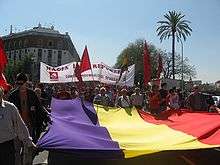 Pro-Republican demonstration in Seville, April 2006
Pro-Republican demonstration in Seville, April 2006- Monument to former Los Llanos de Aridane Republican major Francisco Rodríguez Betancourt. The flag on the left with its oversized coat of arms is a recent commercial version.
 Madrid 19 June 2011 demonstration
Madrid 19 June 2011 demonstration 2012 demonstration in Las Palmas
2012 demonstration in Las Palmas- Republican demonstration in the Puerta del Sol on the day that Juan Carlos I announced his decision to abdicate
See also
References
- 1 2 La Tricolor. Breve historia de la Bandera Republicana
- ↑ Decreto de 27 de abril de 1931 de Presidencia del Gobierno Provisional de la República.
- ↑ Workers' Commissions demonstration
- ↑ United Left logo
- ↑ Republican demonstration
- ↑ demonstration
- ↑ decreto del 27 de abril de 1931 de la Presidencia del Gobierno Provisional de la República
- ↑ Poster - Allegory of the Spanish Republic
- ↑ Versions of the colors of the Flag of the Second Spanish Republic
- ↑ ABC - La república
- ↑ Pendón Real de Castilla. Principios del siglo XVI
- ↑ Ministerio de Defensa - Isabel II (1833 - 1868)
- ↑ Los colores «republicanos» del Real Madrid - ABC.es
- ↑ La Franja Morada
- ↑ El Real Madrid debe recuperar la franja morada en su escudo
- ↑ Spanish Medical Aid Committee
External links
| Wikimedia Commons has media related to Flags of the Spanish Second Republic. |
- Armada Española - Segunda República (1931 - 1939)
- The Flags of Spain. Flags of the World
- Asturias Republicana
- Ministerio de Defensa - Insignias Jefes de Estado; Presidente de la II República
- Second Spanish Republic National Anthem
- Images
- La bandera de la República Española ondea por primera vez en París
- La Bandera Republicana ondea en París
.svg.png)
.svg.png)
